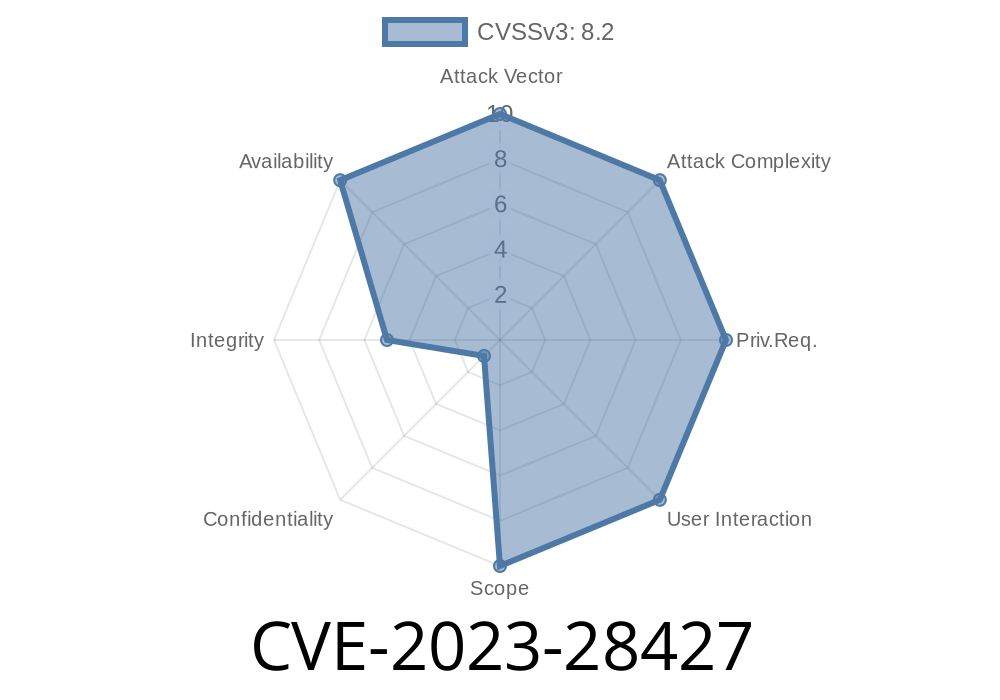The Matrix protocol is a popular open standard for secure, decentralized messaging. If you’re using JavaScript to build a client or integration for Matrix, chances are you use matrix-js-sdk. It’s the go-to official SDK for communicating with Matrix servers.
But what if someone could send your client a special event that makes your code misbehave, silently discarding or corrupting messages—and you wouldn’t even know? That’s the risk behind CVE-2023-28427.
In this article, we’ll break down the vulnerability, show a simple exploit example, and explain how to stay safe.
What is CVE-2023-28427?
CVE-2023-28427 is a bug affecting matrix-js-sdk in versions *before 24..*. The vulnerability comes from how the SDK handles certain event payloads—specifically, if a message contains certain “special strings” in key spots, it can disrupt how matrix-js-sdk processes data. That can result in the client excluding, losing, or corrupting information that should be shown.
- Potential impact: The chat might appear normal, but some important events (like messages) might be missing, misordered, or corrupted.
No simple workaround: The only fix is to upgrade to 24.. or later.
This is not the same as GHSA-rfv9-x7hh-xc32, which fixed a similar but different flaw.
Where Did The Problem Come From?
Matrix events can have rich, nested data—think messages, login info, read receipts, and more. matrix-js-sdk expects certain fields to be regular strings or objects.
But, if an attacker sends an event where, say, a field that’s expected to be a simple string is actually a string that “looks like” JavaScript code, or otherwise tricks the serialization/deserialization process, the SDK may choke. In the worst cases, it may:
Let’s look at a simplified example of handling a room message
import sdk from "matrix-js-sdk";
const client = sdk.createClient("https://matrix.example.com";);
client.on("Room.timeline", (event, room, toStartOfTimeline) => {
// Let's say the event sender put a "special string" in the event's content
const msgType = event.getContent().msgtype;
const body = event.getContent().body; // This could have a tricky string!
console.log(User sent message: [${body}]);
// ...additional app logic...
});
If an attacker sends a message where body is a string with certain special patterns (e.g., crafted Unicode, malformed surrogates, very long strings, or rare JS-JSON edge cases), the SDK code—at *runtime*—might mishandle it, drop it, or corrupt the event's data structure, cascading problems.
The application running above might simply ignore or misreport what’s really happening in the chat!
Exploitation Scenario
- An attacker, or even a careless client, sends a crafted Matrix event with the payload designed to confuse the SDK.
Let’s simulate what a malicious event payload might look like (simplified)
{
"type": "m.room.message",
"content": {
"msgtype": "m.text",
"body": "\"'; DROP TABLE messages; --"
}
}
Strings that look like serialized objects, confusing generic code
If your client relies on event.getContent().body always being normal, and does not sanitize or validate it, you’re putting your app at risk.
Matrix security advisory:
Original CVE record:
SDK changelog:
Upgrade instructions:
No Workarounds:
There are no known ways to block these events on older versions with any reliability. Merely filtering out “suspicious” strings is not enough.
Conclusion
*CVE-2023-28427* is a good case study in how complex parsing bugs in APIs can let small, seemingly innocent strings wreak havoc. If you build on matrix-js-sdk, keeping up-to-date and following official security alerts is your best defense.
Don’t wait until chat messages mysteriously go missing—update your SDK and stay secure!
If you want to learn more about Matrix security, check out
- Matrix Security Advisories
- matrix-js-sdk GitHub Issues
Stay safe and keep your chats healthy!
*(This post is an original, exclusive overview. For further technical details, review the official advisories and changelogs linked above.)*
Timeline
Published on: 03/28/2023 21:15:00 UTC
Last modified on: 05/30/2023 06:16:00 UTC
